人教版2016年秋八年级英语上册《Unit 9 Can you come to my party》同步练习含答案
人教版新目标英语八年级上册《Unit 9 Can you come to my party Sect

人教版新目标英语八年级上册《Unit 9 Can you come to my party Section B 1a-1f》教学设计1一. 教材分析人教版新目标英语八年级上册《Unit 9 Can you come to my party Section B 1a-1f》主要围绕着邀请朋友参加聚会展开。
通过本节课的学习,学生能够掌握情态动词 can 的用法,询问和回答能否参加某个活动,并能够运用所学的词汇和句型进行简单的交流。
本节课的内容与学生的日常生活紧密相连,能够激发学生的学习兴趣和积极性。
二. 学情分析八年级的学生已经具备了一定的英语基础,能够听懂并运用一些基本的英语句型进行交流。
但是,对于情态动词 can 的用法以及一些特殊疑问句的构造还相对陌生,需要通过本节课的学习来掌握。
此外,学生在课堂上的参与度和合作意识也是影响教学效果的重要因素。
三. 教学目标1.知识目标:–掌握情态动词 can 的用法,能够正确询问和回答能否参加某个活动。
–学会运用所学的词汇和句型进行简单的交流。
2.能力目标:–能够听懂、说清、读懂关于邀请和参加聚会的对话。
–能够在日常生活中运用所学的句型进行实际交流。
3.情感目标:–培养学生的合作意识和团队精神。
–提高学生对英语学习的兴趣和积极性。
四. 教学重难点•情态动词 can 的用法。
•运用所学的词汇和句型进行简单的交流。
•特殊疑问句的构造。
•如何在实际交流中运用所学的句型。
五. 教学方法1.任务型教学法:通过设置各种任务,引导学生积极参与课堂活动,提高学生的实际运用能力。
2.情境教学法:通过创设各种真实的社交场景,让学生在特定的情境中学习英语,提高学生的交际能力。
3.合作学习法:鼓励学生进行小组合作,培养学生的团队精神和合作能力。
六. 教学准备1.教材:人教版新目标英语八年级上册。
2.多媒体设备:电脑、投影仪、音响等。
3.教学课件:根据教学内容制作相应的课件。
4.教学素材:与本节课主题相关的图片、视频等。
2016年秋人教版八年级英语上册课件:Unit 9 Can you come to my party (共44张PPT)

must
♦She has to help her mother do the housework at home.她不得不在家帮助 妈妈做家务。 ♦We had to stay at home because it rained.因为下雨,我们不得不待在家里。 ♦We must leave now. 我们现在必须离开。 ♦He must look after his things. 他必须照看好他的东西。
12.(2015〃扬州中考)—You look pretty in green,
Kate.
—Thank you.I like green.Green
energy. A.can B.must C.shቤተ መጻሕፍቲ ባይዱuld D.has to
give me
A [提示:考查情态动词辨析。句意为“你穿上 绿色的衣服看起来漂亮,凯特。”“谢谢你。我 喜欢绿色。绿色能给我能量”。can能;must必 须;should应当;has to不得不。根据句意,故选A。]
14.(2015〃乐山中考)—Mom,the train is leaving in eight minutes.I go now. —Okay,Jim,call me when you get there.
A.may
B.must
C.can
B[提示:考查情态动词的用法。句意为“妈妈,火 车八分钟后就要离开了。我必须现在就走。” “好的,吉姆,当你到那里时,给我打个电话”。 由句意可知,选B。]
3.have to不能直接用来表示 否定或进行提问,需要借助助 动词;must的一般疑问句将其 提前即可。
♦Must he do his homework now? 他必 须现在做作业吗?
人教版英语八年级上册Unit 9《Can you come to my party》教学设计

人教版英语八年级上册Unit 9《Can you come to my party》教学设计一. 教材分析人教版英语八年级上册Unit 9主要讲述了关于邀请别人参加聚会的情境。
通过本单元的学习,学生能够掌握与聚会相关的词汇和表达方式,学会如何礼貌地邀请别人,并能够用英语进行简单的交流。
本单元的核心句型是“Can you come to my party?”,以及回答“Yes, I can.”和“No, I can’t.”。
二. 学情分析八年级的学生已经具备了一定的英语基础,能够听懂并运用简单的英语进行交流。
他们对学习英语有浓厚的兴趣,并且愿意积极参与课堂活动。
然而,部分学生可能在口语表达和听力方面还存在一定的困难,需要教师的引导和帮助。
三. 教学目标1.知识目标:学生能够掌握与聚会相关的词汇和表达方式,学会如何礼貌地邀请别人,并能够用英语进行简单的交流。
2.能力目标:学生能够听懂并运用核心句型“Can you come to my party?”进行交流,提高口语表达能力。
3.情感目标:学生能够在课堂上积极参与,培养合作意识和团队精神。
四. 教学重难点1.重点:学生能够听懂并运用核心句型“Can you come to my party?”进行交流。
2.难点:学生能够正确使用情态动词“can”来表达自己的能力。
五. 教学方法1.情境教学法:通过创设真实的聚会情境,激发学生的学习兴趣,提高他们的口语表达能力。
2.交际法:通过小组讨论和角色扮演等方式,培养学生的合作意识和团队精神。
3.任务型教学法:通过完成各种任务,引导学生主动参与学习过程,提高他们的自主学习能力。
六. 教学准备1.教学材料:教材、多媒体课件、录音机、磁带或音频文件。
2.教学环境:教室布置成聚会场景,悬挂气球、彩带等装饰物。
七. 教学过程1.导入(5分钟)教师以提问的方式引导学生回顾已学过的与聚会相关的词汇,如“birthday party”、“house party”等。
人教新目标英语八年级上册《Unit 9 Can you come to my party》(sectionA1a-2c)教学设计
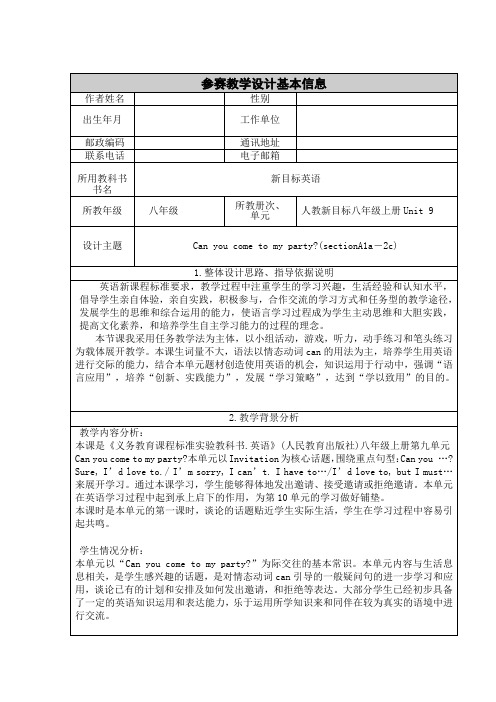
评价方法 教师课上及时口头鼓励,表扬同学们的精彩表现,并配五角星实物图和鼓掌给与小
组合作竞争的评价。课后布置口头练习或布置任务,利用得分制对活动效果或任务的完 成情况进行评价。 练习
Ⅰ.单项选择
( )1.—Can you go to the movies with us tomorrow night?
6.教学评价设计
评价内容: 本课我是以任务教学法为主体,以小组活动,游戏,听力,动手练习和笔头练习为
载体展开教学。并对学生的语言、行为、回答问题、小组竞争给予及时评价。从以下 几个方面来考查学生的学习情况,并将学生的学习评价融入到教学过程中: 1、学生的课堂参与情况,积极主动,声音响亮,能较流畅地表达想要说的话; 2、小组合作学习情况,小组成员共同努力较好的完成学习任务; 3、知识的掌握能力,是否很好的掌握所学,并且能学以致用; 4、少数学困生的学习态度,学生中的两极分化现象比较严重,尤其是中等及中等偏下 的学生对英语学习兴趣不浓,信心不足。
2、以 What do you usually do on weekends? 来提问,这样既可复习旧的句型,也可
以图片呈现方式引处新的短语:study for a test, go to the doctor, have a piano
lesson, help my parents, visit my friends.
人教新目标八年级上册英语《Unit 9 Can you come to my party?》Sect
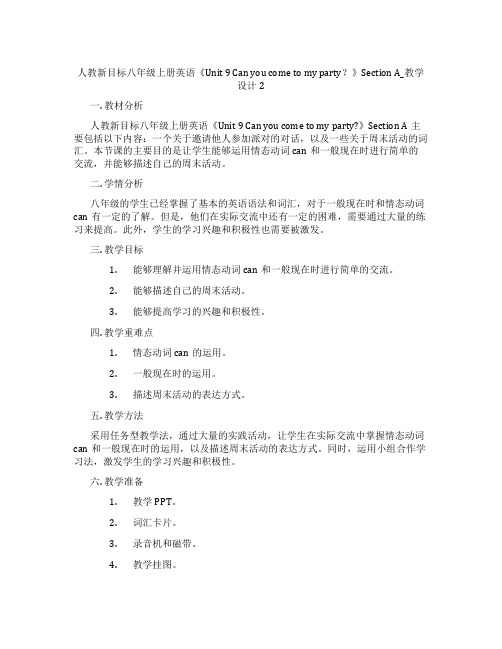
人教新目标八年级上册英语《Unit 9 Can you come to my party?》Section A_教学设计2一. 教材分析人教新目标八年级上册英语《Unit 9 Can you come to my party?》Section A主要包括以下内容:一个关于邀请他人参加派对的对话,以及一些关于周末活动的词汇。
本节课的主要目的是让学生能够运用情态动词can和一般现在时进行简单的交流,并能够描述自己的周末活动。
二. 学情分析八年级的学生已经掌握了基本的英语语法和词汇,对于一般现在时和情态动词can有一定的了解。
但是,他们在实际交流中还有一定的困难,需要通过大量的练习来提高。
此外,学生的学习兴趣和积极性也需要被激发。
三. 教学目标1.能够理解并运用情态动词can和一般现在时进行简单的交流。
2.能够描述自己的周末活动。
3.能够提高学习的兴趣和积极性。
四. 教学重难点1.情态动词can的运用。
2.一般现在时的运用。
3.描述周末活动的表达方式。
五. 教学方法采用任务型教学法,通过大量的实践活动,让学生在实际交流中掌握情态动词can和一般现在时的运用,以及描述周末活动的表达方式。
同时,运用小组合作学习法,激发学生的学习兴趣和积极性。
六. 教学准备1.教学PPT。
2.词汇卡片。
3.录音机和磁带。
4.教学挂图。
七. 教学过程1.导入(5分钟)通过播放一段关于派对的音频,引导学生谈论派对,激发学生的学习兴趣。
2.呈现(10分钟)利用PPT展示本节课的主要内容,包括对话和词汇。
让学生跟读对话,熟悉词汇。
3.操练(15分钟)将学生分成小组,每组分配一张词汇卡片,让学生用情态动词can和一般现在时进行交流,描述卡片上的词汇。
教师巡回指导,纠正发音和语法错误。
4.巩固(10分钟)让学生在小组内互相提问,用情态动词can和一般现在时描述自己的周末活动。
教师巡回指导,纠正发音和语法错误。
5.拓展(10分钟)让学生自由发挥,用情态动词can和一般现在时编写一段对话,描述自己和他的朋友的周末活动。
Unit9Can you come to my party 词汇及情态动词讲解-人教版八年级英语上册

1. —____________ I try on those shoes in the window?
—_______________. They are just on show.
A. Could; Yes, you can
B. Can; Sorry, you couldn’t
number.
—Sure. Here it is.
A. Can
B. Need
C. Might
D. Must
Must提问时的否定回答
—Must I go home now? —Yes, you must.
needn’t. No, you
don’t have to. Must提问时否定回答 用 needn’t 或 don’t/doesn’t have to.
Unit 9 Can you come to my party?
词汇及情态动词讲解
词汇 练习 语法 综合练习
目录
1. invite v. 邀请 invitation n. 邀请 invite sb. to do sth. 邀请某人做某事
Eg: Hehua invites us to watch the soap opera. Guo invited Qin to drink, but he turned him down..
Task 2 单选
( ) 1.Julie didn't leave office _____the police arrived.
A. however B. whenever C. while D. until
( ) 2.My friend invited me _____the art club, and I
初中英语人教版八年级上册《Unit9Can you come to my party Section

today
tomorrow
Thursday the__2_7t_h_
The day after tomorrow
Friday the_2_8_t_h __
weekday
Saturday the__2_9t_h__
weekend
(1)—What's today? 今天是什么日期?
—It's Monday the 14th.今天是14号,星期一。
Unit 9 Can you come to my party?
Section B (1a-1e)
人教新目标版 七年级下
1
If today is New Year’s Day, What’s the date today? --It’s January 1st.
Today is Chrismas, -What’s the date today? --It’s December 25th.
Satur
There are seven days in a week.
Monday Tuesday Wednesday Thursday Friday Saturday XXXday
weekdays weekend
Wednesday
十月 12
What day is it today? It’s Wednesday. What’s the date today? It’s October 12th. What’s today? It’s Wednesday the 12th.
Vince: I have to look after my little sister.
Andy: Oh, I see.
Vince: I’m sorry, Andy. I’m really busy this week!
人教版八年级英语上册unit 9 Can you come to my party单词讲解课件

refuse /rɪ'fju:z/ v.拒绝
refuse sb. refuse to do sth.
拒绝 yesterday 前天
the day after tomorrow 后天
weekday /ˈwi:kdeɪ/ n.工作日 (星期一至星期五的任何一天)
一封邀请函
an invitation
an invitation to … turn down 拒绝
……的邀请 还可指“调低(音量)”
turn down an invitation
reply /rɪ'plaɪ/ v.回答;回复
reply to sb. reply to sth.
回复sb. 回应sth.
Unit 9 Can you come to my party?
单词讲解
prepare for 为……做准备
= get/be ready for
exam /ɪɡ'zæm/ n.(=examination)考试
一场考试
an exam
have/take an exam 参加考试
pass the exam
hang /hæŋ/ v.(hung /hʌŋ/)悬挂;垂下
Hang the picture on the wall,please.
hang out 闲逛;常去某处 hang out with friends 和朋友一起闲逛 hang 用作动词 “吊死,绞死”时,其过去式为hanged
catch /kætʃ/ v.及时赶上;接住 ;抓住 第三人称单数:catches 过去式:caught Catch you tomorrow.=See you tomorrow. 明天见。
人教版新目标八年级上册英语《 Unit 9 Can you come to my party》Section A (1a -2c)教学设计
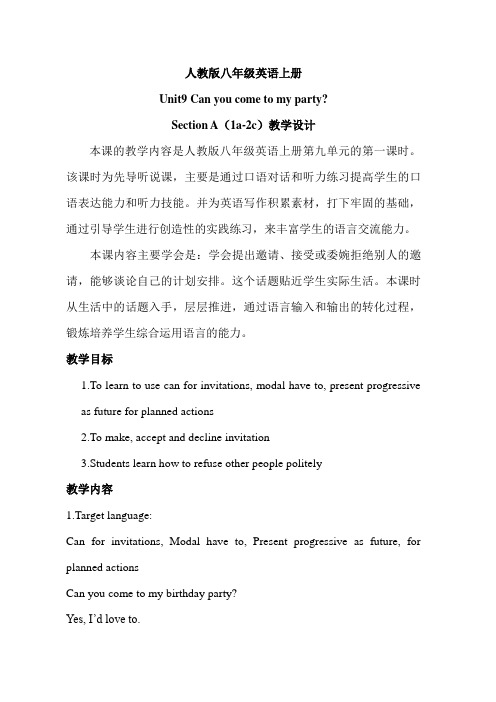
人教版八年级英语上册Unit9 Can you come to my party?Section A(1a-2c)教学设计本课的教学内容是人教版八年级英语上册第九单元的第一课时。
该课时为先导听说课,主要是通过口语对话和听力练习提高学生的口语表达能力和听力技能。
并为英语写作积累素材,打下牢固的基础,通过引导学生进行创造性的实践练习,来丰富学生的语言交流能力。
本课内容主要学会是:学会提出邀请、接受或委婉拒绝别人的邀请,能够谈论自己的计划安排。
这个话题贴近学生实际生活。
本课时从生活中的话题入手,层层推进,通过语言输入和输出的转化过程,锻炼培养学生综合运用语言的能力。
教学目标1.To learn to use can for invitations, modal have to, present progressiveas future for planned actions2.To make, accept and decline invitation3.Students learn how to refuse other people politely教学内容1.Target language:Can for invitations, Modal have to, Present progressive as future, for planned actionsCan you come to my birthday party?Yes, I’d love to.Sorry, I can’t. I have to study for a test.I’m sorry. I’m playing soccer on Saturda y.2.Learning strategies: Inducing, Cooperating教学步骤Step 1.Lead-inPlay a song “H appy Birthday”. Let students describe the meaning of this song and guess what will happen.【设计意图】通过常见的英语歌曲引入新课,贴近生活,创设熟悉的生活环境。
人教版新目标英语八年级上册《Unit 9 Can you come to my party Sect

人教版新目标英语八年级上册《Unit 9 Can you come to my party Section B 1a-1e》教学设计1一. 教材分析人教版新目标英语八年级上册《Unit 9 Can you come to my party Section B 1a-1e》主要讲述了邀请朋友参加聚会的情景。
本节课主要让学生掌握情态动词can的用法,能够用can提问和回答邀请,以及表达自己和他人的喜好。
通过本节课的学习,学生能够提高听力、口语、阅读和写作能力。
二. 学情分析八年级的学生已经具备一定的基础知识,对于情态动词have和do的用法有一定的了解。
但学生在实际应用中,尤其是在听力方面还需加强。
此外,学生对于西方的聚会文化可能了解不多,需要在教学中进行适当的引导和拓展。
三. 教学目标1.知识目标:学生能够掌握情态动词can的用法,能够用can提问和回答邀请,以及表达自己和他人的喜好。
2.能力目标:学生能够提高听力、口语、阅读和写作能力。
3.情感目标:通过本节课的学习,学生能够学会礼貌地邀请他人参加聚会,提高人际交往能力。
四. 教学重难点1.重点:学生能够掌握情态动词can的用法,能够用can提问和回答邀请,以及表达自己和他人的喜好。
2.难点:学生能够在实际情景中正确运用情态动词can,尤其是在听力方面。
五. 教学方法1.任务型教学法:通过设置各种真实的任务,让学生在完成任务的过程中运用所学知识。
2.交际法:通过模拟真实的交际情景,让学生在实际交流中提高口语能力。
3.视听法:利用多媒体教学资源,提高学生的听力能力。
六. 教学准备1.教师准备:备好相关教学材料,如PPT、听力材料、练习题等。
2.学生准备:预习本节课的内容,了解基本的聚会文化。
七. 教学过程1.导入(5分钟)教师通过提问方式引导学生回顾情态动词have和do的用法,为新课的学习做好铺垫。
2.呈现(5分钟)教师播放听力材料,让学生听懂并理解邀请他人参加聚会的情景。
初中英语人教版八年级上册Unit 9Can you come to my party
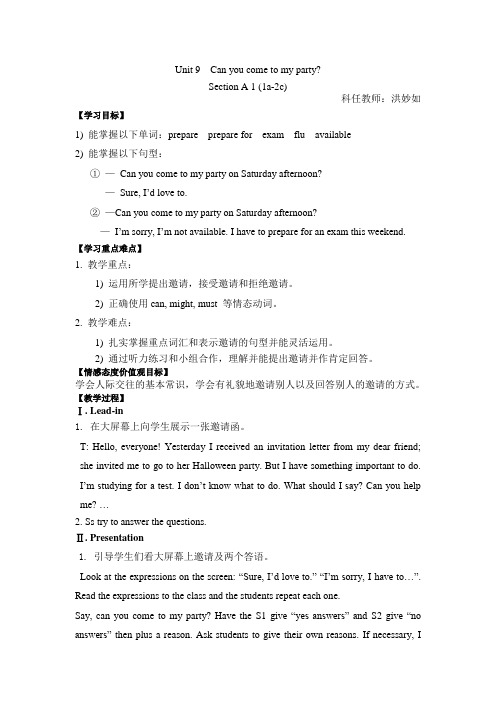
Unit 9 Can you come to my party?Section A 1 (1a-2c)科任教师:洪妙如【学习目标】1) 能掌握以下单词:prepare prepare for exam flu available2) 能掌握以下句型:①—Can you come to my party on Saturday afternoon?—Sure, I’d love to.②—Can you come to my party on Saturday afternoon?—I’m sorry, I’m not available. I have to prepare for an exam this weekend. 【学习重点难点】1. 教学重点:1) 运用所学提出邀请,接受邀请和拒绝邀请。
2) 正确使用can, might, must 等情态动词。
2. 教学难点:1) 扎实掌握重点词汇和表示邀请的句型并能灵活运用。
2) 通过听力练习和小组合作,理解并能提出邀请并作肯定回答。
【情感态度价值观目标】学会人际交往的基本常识,学会有礼貌地邀请别人以及回答别人的邀请的方式。
【教学过程】Ⅰ. Lead-in1. 在大屏幕上向学生展示一张邀请函。
T: Hello, everyone! Yesterday I received an invitation letter from my dear friend; she invited me to go to her Halloween party. But I have something important to do. I’m studying for a test. I don’t know what to do. What should I say? Can you help me? …2. Ss try to answer the questions.Ⅱ. Presentation1. 引导学生们看大屏幕上邀请及两个答语。
人教版八年级上册Unit 9 Can you come to my party?
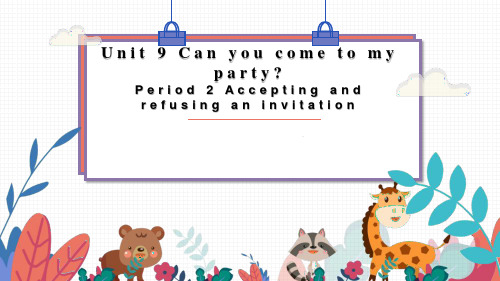
2d Role-play the conversation.
Jeff: Hey, Nick, can you come to my house on Saturday? My cousin Sam from Xi’an is going to be here.
3. Catch you on Monday! “周一见!” = See you on Monday!
Practice: Make up a conversation.
Example: A: Hi, _M__a_ry_, can you g_o__to__th_e__m_o_v_i_e_s_w__it_h_m__e
Revision
Revision
A: Can you come to my birthday party? B: Sure, I’d love to.
Revision
go to the movies
go to the doctor
A: Can you go to the movies?
B: I’m sorry, I can’t. I must go to the doctor.
Listening
Listen to the conversation 2d and answer the questions.
1. Why did Jeff invite Nick to his house?
2. Did Nick accept the invitation at first? Why?
Language Points 2d
1. not … until … “直到……才……” e.g. Don’t leave today’s work till tomorrow. I didn’t go to bed last night until past midnight.
人教新目标八年级上册英语《Unit 9 Can you come to my party?》Sect

人教新目标八年级上册英语《Unit 9 Can you come to my party?》Section A_教案3一. 教材分析人教新目标八年级上册英语《Unit 9 Can you come to my party?》Section A,主要讲述了一个关于邀请朋友参加派对的对话。
本节课主要学习一般现在时的疑问句和回答,以及情态动词can的用法。
通过本节课的学习,学生能够听懂、会说、会读本节课的主要单词和句型,并能运用所学知识进行实际交流。
二. 学情分析八年级的学生已经掌握了基本的英语语法和词汇,对于一般现在时和情态动词有一定的了解。
但部分学生在发音和听力方面还存在困难,需要老师在教学中给予关注和指导。
同时,学生对于实际生活中的邀请和回复还不够熟悉,需要通过本节课的学习来提高这方面的交际能力。
三. 教学目标1.能够正确听懂、说出一般现在时的疑问句和回答。
2.能够熟练运用情态动词can提问和回答。
3.能够运用所学知识进行实际邀请和回复的交流。
4.提高学生的听说能力和团队协作能力。
四. 教学重难点1.一般现在时的疑问句和回答。
2.情态动词can的用法。
3.实际生活中的邀请和回复。
五. 教学方法1.任务型教学法:通过设置不同的任务,让学生在实际操作中运用所学知识。
2.情境教学法:创设生活情境,让学生在真实的环境中学习英语。
3.互动式教学法:引导学生积极参与课堂活动,提高课堂氛围。
六. 教学准备1.教学课件:制作课件,包括本节课的主要单词、句型和听力材料。
2.教学道具:准备一些与派对相关的道具,如气球、蛋糕等。
3.录音机和磁带:准备听力材料的相关录音机和磁带。
七. 教学过程1.导入(5分钟)利用录音机播放一段派对的场景录音,引导学生谈论派对相关的话题,激发学生的学习兴趣。
2.呈现(10分钟)老师通过课件展示本节课的主要单词和句型,如:balloon, cake, can you come to my party? 等,并引导学生跟读。
人教版英语八年级上册 Unit 9 Can you come to my party?单元

7. |滨州中考|— C I swim here?
—I’m sorry. Children
swim alone here. It’s very
dangerous.
A.Must; can’t
B.May; must
C.Can; mustn’t
D.Can’t; can
【解析】考查情态动词的用法。句意:“我可以在这儿游泳吗?”“抱歉,孩子 们绝对不能单独在这儿游泳,这太危险了。”由后句可知,上句应该是请求 允许;由dangerous可知,第二空表示“禁止,绝对不能”。故选C。
5. However, I’d still be glad to help out with any of the party preparations, like planning the games. 然而,我还是乐意帮忙筹办聚会,如设计游戏。
6. Let me know if you need my help. 如果你需要我帮忙,就告诉 我吧。
5. 你们不能在教室里听音乐。 Y_o_u_c_a_n_'t_l_is_te_n_t_o_m_u_s_ic_i_n_t_h_e _cl_a_ss_r_oo_m__. ____________________
妙解写作
如何写关于“邀请”的应用文 本单元的话题和“邀请”有关,该话题经常涉及的场景有 生日聚会(birth-day party)、欢迎会(welcome party)等。学习 了本单元之后,我们要学会如何 写邀请函,还要学会如何发 出邀请(make the invitation)、接受邀请(accept the invitation) 和拒绝邀请(refuse the invitation)。其中,最常见的形式是
(完整word版)人教版人教版八年级上册英语第九单元Unit9Canyoucometomyparty
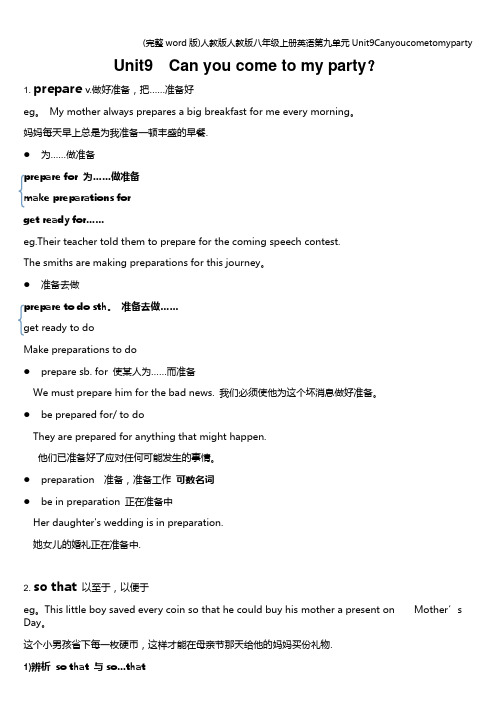
Unit9 Can you come to my party?1. prepare v.做好准备,把……准备好eg。
My mother always prepares a big breakfast for me every morning。
妈妈每天早上总是为我准备一顿丰盛的早餐.●为……做准备prepare for 为……做准备make preparations forget ready for……eg.Their teacher told them to prepare for the coming speech contest.The smiths are making preparations for this journey。
●准备去做prepare to do sth。
准备去做……get ready to doMake preparations to do●prepare sb. for 使某人为……而准备We must prepare him for the bad news. 我们必须使他为这个坏消息做好准备。
●be prepared for/ to doThey are prepared for anything that might happen.他们已准备好了应对任何可能发生的事情。
●preparation 准备,准备工作可数名词●be in preparation 正在准备中Her daughter's wedding is in preparation.她女儿的婚礼正在准备中.2. so that以至于,以便于eg。
This little boy saved every coin so that he co uld buy his mother a present on Mother’s Day。
这个小男孩省下每一枚硬币,这样才能在母亲节那天给他的妈妈买份礼物.1)辨析so that 与so…thatso that 表示目的(多) 表结果She worked hard so that everything would be ready in time。
人教版八年级英语上册《nit 9 Can you come to my party. Section A .3a—3c》优质课教案_19
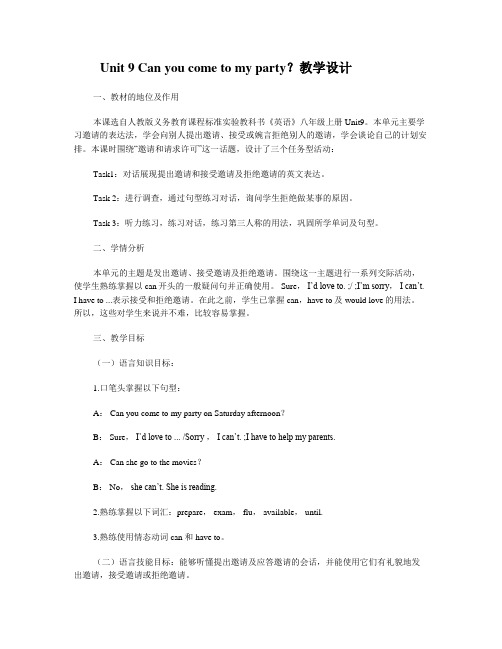
Unit 9 Can you come to my party?教学设计一、教材的地位及作用本课选自人教版义务教育课程标准实验教科书《英语》八年级上册Unit9。
本单元主要学习邀请的表达法,学会向别人提出邀请、接受或婉言拒绝别人的邀请,学会谈论自己的计划安排。
本课时围绕“邀请和请求许可”这一话题,设计了三个任务型活动:Task1:对话展现提出邀请和接受邀请及拒绝邀请的英文表达。
Task 2:进行调查,通过句型练习对话,询问学生拒绝做某事的原因。
Task 3:听力练习,练习对话,练习第三人称的用法,巩固所学单词及句型。
二、学情分析本单元的主题是发出邀请、接受邀请及拒绝邀请。
围绕这一主题进行一系列交际活动,使学生熟练掌握以can开头的一般疑问句并正确使用。
Sure,I’d love to. ;/ ;I’m sorry,I can’t.I have to ...表示接受和拒绝邀请。
在此之前,学生已掌握can,have to及would love的用法。
所以,这些对学生来说并不难,比较容易掌握。
三、教学目标(一)语言知识目标:1.口笔头掌握以下句型:A: Can you come to my party on Saturday afternoon?B: Sure,I’d love to ... /Sorry ,I can’t. ;I have to help my parents.A: Can she go to the movies?B: No,she can’t. She is reading.2.熟练掌握以下词汇:prepare, exam, flu, available, until.3.熟练使用情态动词 can 和have to。
(二)语言技能目标:能够听懂提出邀请及应答邀请的会话,并能使用它们有礼貌地发出邀请,接受邀请或拒绝邀请。
(三)情感态度:培养学生有礼貌地与他人交往的能力。
四、教学重、难点(一)教学重点:1. 运用所学提出邀请,接受邀请和拒绝邀请。
人教版英语八年级上册Unit 9 Can you come to my party (2)
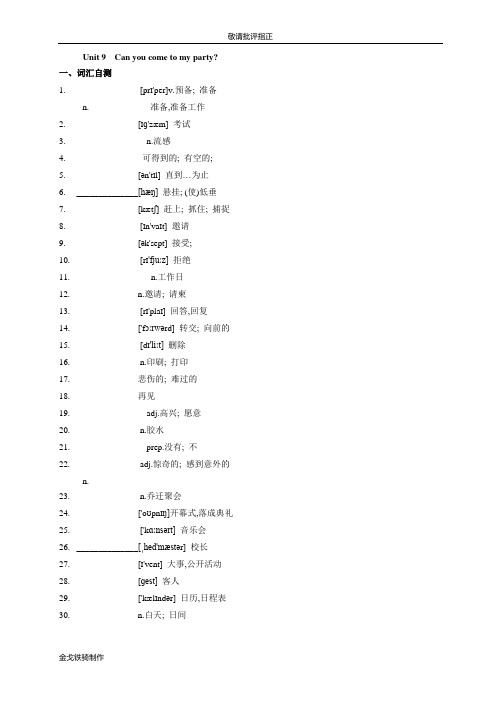
敬请批评指正Unit 9 Can you come to my party?一、词汇自测1.______________ [prɪ'per]v.预备; 准备--n.______________准备,准备工作2.______________[ɪɡ'zæm] 考试3.______________ n.流感4.______________ 可得到的; 有空的;5.______________[ən'tɪl] 直到…为止6.______________[hæŋ] 悬挂; (使)低垂7.______________[kætʃ] 赶上; 抓住; 捕捉8.______________ [ɪn'vaɪt] 邀请9.______________[ək'sept] 接受;10.______________ [rɪ'fjuːz] 拒绝11.______________ n.工作日12.______________n.邀请; 请柬13.______________ [rɪ'plaɪ] 回答,回复14.______________['fɔːrwərd] 转交; 向前的15.______________ [dɪ'liːt] 删除16.______________ n.印刷; 打印17.______________悲伤的; 难过的18.______________再见19.______________ adj.高兴; 愿意20.______________ n.胶水21.______________ prep.没有; 不22.______________ adj.惊奇的; 感到意外的--n.______________23.______________ n.乔迁聚会24.______________['oʊpnɪŋ]开幕式,落成典礼25.______________ ['kɑːnsərt] 音乐会26.______________[ˌhed'mæstər] 校长27.______________[ɪ'vent] 大事,公开活动28.______________[ɡest] 客人29.______________['kælɪndər] 日历,日程表30.______________n.白天; 日间二、重点短语集锦1.为……做准备________________________1.去看医生____________________________2.患感冒____________________________3.来参加聚会________________________4.去聚会____________________________5.准备考试____________________________6.有空的____________________________7.其他时间____________________________8.不得不____________________________9.出去闲逛___________________10.后天____________________________11.前天____________________________12.照看; 照顾______________________13.邀请某人去做某事____________________14.接受邀请____________________________15.拒绝邀请____________________________16.去旅行____________________________17.这个月末____________________________18.的开幕式/落成典礼___________________19.去听音乐会______________________20.会见我的朋友________________________21.拜访祖父母_________________________22.为考试学习_________________________23.太多作业____________________________24.去看电影______________________25.在周末____________________________26.表示感谢和道别的最好方式____________________________27.为某人举办一个惊喜派对____________________________28.盼望; 期待_______________________29.直到……才________________________30.闲逛____________________________31.练习小提琴________________________32.骑自行车兜风________________________33.愿意去做某事________________________34.至今为止____________________________35.回去____________________________36.本周五之前______________________37.对……答复________________________。
- 1、下载文档前请自行甄别文档内容的完整性,平台不提供额外的编辑、内容补充、找答案等附加服务。
- 2、"仅部分预览"的文档,不可在线预览部分如存在完整性等问题,可反馈申请退款(可完整预览的文档不适用该条件!)。
- 3、如文档侵犯您的权益,请联系客服反馈,我们会尽快为您处理(人工客服工作时间:9:00-18:30)。
人教版2016-2017学年秋八年级英语上册Unit9 Can you come to my party一、单项选择(共20小题;共20分)1. --- you tell us a story in English?--- Certainly!A. MustB. ShouldC. Can2. --- you help me with the heavy box?--- With pleasure.A. MustB. ShouldC. CanD. Need3. --- you come with me to Lang Lang's piano concert this evening?--- I'd love to, but I have to study for my math test.A. ShouldB. MayC. MustD. Can4. Drivers wear seat belts while their cars are running on the road.A. needB. canC. mustD. may5. He said the news be true, but he was not sure.A. needB. mightC. canD. must6. Susan has the flu. She go to the doctor.A. mustB. has toC. canD. have to7. --- Hello! Golden Sun Hotel. Can I help you?--- Do you have a room for this weekend?A. availableB. usefulC. emptyD. possible8. --- Tom, you look tired this morning. What's wrong?--- I was so busy that I didn't go to bed 12 o'clock last night.A. untilB. whenC. thoughD. unless9. Would you please my baby brother while I'm cooking?A. take out ofB. take care ofC. take part inD. take away from10. --- Can you come to my house for dinner this Sunday, Mary?--- .A. I'd love to, but I have a lot of things to doB. Oh, that'll be too boringC. I'll stay at homeD. Yes, I can't11. --- you come to my birthday party tomorrow, Robert?--- I'm afraid not. I have lots of homework to do.A. MustB. ShouldC. CanD. Need12. --- Mr. Jackson, we go rock climbing?--- Yes, but you must use ropes.A. mustB. shouldC. needD. can13. you bring the book to school?A. AreB. IsC. CanD. Please14. --- Shall we go skateboarding after school?--- Sorry, my parents said that I be at home early.A. needB. mustC. may15. You mustn't go off on your own, because you get lost in the mountains.A. shouldB. mustC. needD. might16. --- Would you like to go shopping with me now?--- I'm afraid I can't. I wash my clothes.A. canB. mayC. wouldD. have to17. Gina, are you available this afternoon?A. at lastB. overC. arrived inD. free18. --- You don't look well, what's wrong with you, Wang Ming?--- Last night I watched the football match and didn't go to bed 12 o'clock.A. whenB. untilC. asD. while19. Thanks for your invitation, but I'm so sorry I can't go. I need to my children at home.A. take offB. take care ofC. take outD. take away20. --- Can you stay here longer?--- . But I have to be back tomorrow.A. I'd love toB. I'm afraid notC. I'm sorry, I can'tD. No, thank you二、单词拼写(单句首字母填空)(共10小题;共10分)21. I am very s that the little boy can play the violin so well.22. He never r to any of my letters.23. If we are lucky enough we can c the early bus.24. When you a a present, you must use both hands.25. The young people gathered in order to p to save their home.26. --- Can you go to the movies tonight?--- Sorry, I'm not a . I'm very busy.27. He r to go to the party and I had to go there instead.28. This famous pianist is going to give a c in our city next week.29. Big e are always covered live for the public.30. I'm glad to receive your i and I'd love to go.三、单词拼写(根据中文提示拼写单词)(共10小题;共10分)31. She looked (惊讶的) when I told her that.32. Tim asked me to play computer game with him. But I want to (拒绝) him.33. Though I am poor, I don't want to (接受) your money.34. Mum always (准备) new clothes for me before the Spring Festival.35. Selina is going to (邀请) her pen pal to her hometown this summer vacation.36. I'm a (有空的). I can hang out with you tomorrow.37. How many (客人) were there at his birthday party?38. Yesterday we went to a (音乐会).39. --- What time can I (打印) those documents?--- At nine o'clock.40. I called up yesterday, but there was no (回答).四、翻译(根据中文提示完成句子)(共5小题;共10分)41. 我必须为考试做准备。
I an exam.42. 初中毕业后每个学生都有很多东西可以期待。
(词数不限) (look)Each student can many things after they leave junior high school.43. 一收到妈妈的来信,她就立刻启程回家。
(hear) (词数不限)She will set off for home at once as soon as she her mother.44. 你可以与朋友一起去玩,但不要太晚。
You can your friend, but late.45. I'm afraid I can't come to your party. I have to (为……准备) tomorrow's math test.五、完形填空(共10小题;共15分)It is common in English to ask people about their holidays. In the west, many families 46 on holiday during the summer months, and it is very usual to 47 about this. If the holiday has not yet taken place, then their holiday plan will be 48 about. And if it is already over, then where they went, whether they 49 it and so on can be discussed. Similar questions are asked before some public 50 . Foreigners living and working in China often have 51 for travel, either at weekends or during their holidays, so such kind of 52 lead to lots of talks. They may be 53 to know if they have chosen the 54 places, especially those a little less 55 ones.46. A. stay home B. go away C. make money D. visit friends47. A. ask B. know C. write D. see48. A. heard B. read C. worried D. talked49. A. knew B. liked C. spent D. ended50. A. places B. holidays C. planes D. classrooms51. A. chance B. money C. planes D. time52. A. stories B. facts C. excuses D. questions53. A. worried B. interested C. tired D. pleased54. A. right B. wrong C. same D. far-away55. A. difficult B. expensive C. helpful D. famous六、阅读理解(共16小题;共32分)AAmericans think much about time. From childhood they learn to value(珍视) time. As children they are taught to be on time to go to school, to work and to do everything. When they are having a good time, they say that time goes easily. When a person is dying, they say he is living on a borrowed time.Time is money. Time is knowledge. Time is everything in America. A working American has to work hard for more money. Even on Saturday and Sunday he also works hard as usual. In the street you can hardly see a man walking slowly. They walk very fast. In fact, they are running.They love time because time can bring them money and lots of things. But sometimes they also hate time, because they feel they have become servants(仆人) of the clock.56. What do the Americans mean by “Time is money”?A. If someone has time and works hard, he can make a lot of moneyB. It takes quite a lot of time to make moneyC. Working hard can bring people healthD. It is not easy to make money57. The passage says that a dying person .A. is having a good timeB. thinks time goes easilyC. is living on a borrowed timeD. is saving time58. From this passage we can be sure that .A. Americans live in a quick rhythm(节奏)B. Americans live a hard lifeC. Americans are good at saving timeD. Americans always walk fastBVenice Is Sinking Down (威尼斯在下沉)Venice is a beautiful city in northern Italy. It is very famous because it is built on many islands and it looks like it is built on water. There are 117 islands in Venice. Venice is famous for its architecture(建筑) and well-known people who were born there. One was Antonio Vivaldi.Today, Venice has a big problem because it is sinking down deeper and deeper into the water. It is sinking down about 4 centimeters every 10 years. It doesn't sound like much but it is a big problem because there are more and more floods(洪水) every year and people now have to use special wooden bridges to walk in the city.In the last 170 years, the city sank down about 60 centimeters. If it sinks 50 more centimeters, there will be a serious problem for everybody living there.59. Venice is a famous city built .A. on waterB. on islandsC. under the waterD. near the island60. Where was Antonio Vivaldi born?A. In England.B. In Italy.C. In America.D. In Germany.61. From the second paragraph, we can know .A. Venice is sinking down about 4 cm every yearB. people are proud of VeniceC. there are fewer floods in Venice every yearD. people have to pass special wooden bridges to walk in Venice62. How many centimeters did Venice sink for about 170 years?A. About 30.B. About 40.C. About 50.D. About 60.63. Which of the following is NOT true according to this passage?A. The architecture in Venice is very famous in the world.B. There are more than one hundred islands in Venice.C. Now Venice is sinking deeper and deeper into the water.D. People won't live in Venice any longer in 50 years.CBicycles in ChinaBicycles are very popular in China. In our country you can see bicycles almost everywhere. When you walk on the road, you will find a lot of people riding bicycles to school, shops and anywhere else. Therefore(因此), China is known as "the kingdom of bicycles". In China, many families have one or two bicycles.Compared(与… 比) with cars, bicycles have many advantages. First, they are much cheaper than cars. Most Chinese can't afford cars, but they can afford bicycles. Second, bicycles are small enough to park anywhere, while cars need a larger piece of land to park. What's more, with lower speed, bicycles are safer than cars.However, bicycles also bring some problems. Some riders don't obey the traffic rules and some riders don't think about others' safety. So they ride too fast. During rush hours, too many bicycles may cause traffic jams. We still have a long way to go to solve the problem.64. Where can you see bicycles in China?A. In the big city.B. In the town.C. In the country.D. Almost everywhere.65. "The kingdom of bicycles" here is saying .A. China has a large number of bicyclesB. China makes bicyclesC. bicycles are a kingdomD. only China has bicycles66. Which of the following is NOT an advantage of bicycles?A. Bicycles are much cheaper than cars.B. Bicycles are easy to park.C. Bicycles are more beautiful than cars.D. Bicycles are safer than cars.67. What problems can bicycles bring?A. Bicycles are more and more expensive.B. Riding bicycles is more dangerous than driving cars.C. There are no places for so many bicycles.D. Too many bicycles may cause traffic jams.68. What does the last sentence mean?A. We should drive cars instead of riding bicycles.B. It's too far to ride bicycles.C. Bicycles are safe enough.D. We still need to do much to solve the problem.DParis is the capital of France. Its subway is also very special. You can enjoy its culture when you are in this city. First you can see many people reading books in the subway. Whenever they are in the subway or at the station, there is always a book in the hand.The subway station in Paris is not big, but each of them has its special facts. Some stations look like ships. Some stations have clothes, caps and shoes. And every station has a big advertisement picture. But many of them are for selling clothes and cosmetics(化妆品).You can meet some beggars(乞丐) in the subway. But the beggars in the Paris subway are also very special. They often play the violin or guitar in the train. They don't feel shy at all. Instead they think it is natural. After playing, they will go around the train and ask you to give them some money.If you want to learn more about Paris, go to the subway and enjoy its culture by yourself.69. What do many people usually do when they are in the subway?A. Listen to music.B. Beg some money.C. Sell clothes and cosmetics.D. Read books.70. How do the beggars get money from people in the subway?A. They often play the violin or guitar in the train.B. They usually brush shoes for the passengers.C. They often steal money from the shops.D. They usually help the passengers carry suitcases.71. What's the main idea of this passage?A. Reading in the Paris subway.B. The subway is a window of the Paris culture.C. The beggars in the Paris subway usually have some skills.D. Each of the subway station in Paris has its special facts.七、短文7选5(5选5等)(共4小题;共8分)Mary is thirteen years old. She has a little sister. 72. Kate is only four. Mary likes Kate very much.It was Sunday. Mary didn't go to school. 73. She took out her exercise book and pencil case. "Oh, dear! Where's my pen?" Mary's pen wasn't in the pencil case. She looked for (寻找) it everywhere but she couldn't find it. Then she went to ask her sister in the bedroom. "Kate! 74. Did you see... Oh, what are you doing with my pen?" asked Mary. "I' m writing a letter(信) to my friend Betty," said Kate. "But how can you do it? You even can't write." Mary was very surprised. "75. Betty can't read," said Kate.A. She wanted to do her homework.B. Her name is Kate.C. It doesn't matter (没关系).D. You don't have any friends.E. I can't find my pen.八、阅读与表达(问答式)(共5小题;共10分)The first Earth Day was in 1970. People were beginning to worry about what we were doing to our environment. So they set up Earth Day to tell everyone about their worries.In 2007 organisers in over 150 countries planned over 4,000 big events. But Earth Day is not just about marches(游行) and big events. In the week around Earth Day (22 April) there were many thousands of smaller, local events. These events dealt with environmental problems in the neighbourhood.The World Wide Fund for Nature made a list of 5 things that each person could do to help to save the environment.Don't leave the tap running.Turn off lights when you leave a room.Turn off your computer every night.Wash your clothes, and yourself, in warm or cold water, not hot water.Dishwashers use as little water as possible.If we all do at least 2 of these things all the time, we can make a big difference.根据短文内容,完成下列小题。
